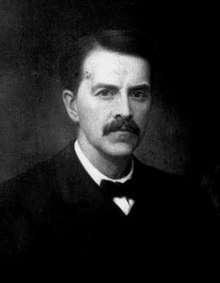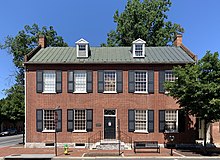Hunter McGuire
Hunter Holmes McGuire, M.D. (October 11, 1835 – September 19, 1900) was a physician, teacher, and orator. McGuire was a surgeon in the Confederate Army attached to Stonewall Jackson's command, and he continued serving with the Army of Northern Virginia after Jackson's death. He started several schools and hospitals which later became part of the Medical College of Virginia (MCV) in Richmond, Virginia. McGuire was later president of the American Medical Association. His statue sits prominently on the grounds of the Virginia State Capitol. Nearby, the McGuire Veterans Administration Medical Center is named in his honor.
Hunter McGuire M.D. | |
|---|---|
 Dr. Hunter Holmes McGuire (1835-1900) of Virginia, noted physician, pro-slavery
advocate and educator | |
| Born | October 11, 1835 |
| Died | September 19, 1900 (aged 64) |
| Nationality | United States |
| Education | Winchester Medical College |
| Occupation | Physician, teacher, and orator |
| Known for | Started several schools and hospitals which later became part of the Medical College of Virginia |
| Relatives | Dr. Hugh Holmes McGuire |
| Medical career | |
| Field | Surgery |
| Institutions | Confederate Army |
Biography
Youth and education
Hunter Holmes McGuire was born in Winchester, Virginia on October 11, 1835.[1] His father, Dr. Hugh Holmes McGuire, was a prominent eye surgeon. Young Hunter was one of 7 children. He often accompanied his father, and studied medicine at the Winchester Medical College where he graduated in 1855. His continuing medical education in Philadelphia at Jefferson Medical College was interrupted by the onset of the hostilities which led to the American Civil War. He taught briefly at Tulane University in New Orleans before joining the Confederate Army in 1861.
Civil War
Dr. McGuire joined "The Winchester Rifles," Company F of the 2nd Virginia Infantry as a private in the Confederate Army. However, his services were much more valuable as a doctor rather than a front line soldier.[1] McGuire was made a brigade surgeon and was ordered to report to General Thomas J. Jackson at Harpers Ferry. Jackson initially scoffed at McGuire's youth, but the two became very close as the war progressed. Dr. McGuire treated General Jackson after the First Battle of Manassas, where the General picked up the nickname "Stonewall Jackson" following an exclamation by General Barnard E. Bee Jr. (who himself was killed during the battle).
In 1862, McGuire was promoted to the chief surgeon of Jackson's Corps, serving in the Army of Northern Virginia under its Medical Director, Dr. Lafayette Guild. While attached to Jackson's corps during the Second Bull Run Campaign, McGuire amputated Jackson's subordinate Richard Ewell's leg after Ewell was wounded at the Battle of Groveton.[2] In May 1863, Jackson was gravely wounded by friendly fire while performing a reconnaissance during the Battle of Chancellorsville. The severity of the wounds required Dr. McGuire to amputate Jackson's left arm.[3] Jackson died of pneumonia a few days later. His last words were recorded by Dr. McGuire as: "Let us cross over the river and rest beneath the shade of the trees".[4] The death of Jackson affected McGuire greatly. He would always remember Jackson with the deepest reverence and served as a pallbearer in Stonewall's funeral.

During the Second Battle of Winchester, which was part of Robert E. Lee's invasion of Pennsylvania, McGuire served under Richard Ewell (who by this time had returned to field command).[5] At the Battle of Gettysburg, Dr. McGuire amputated the leg of General Isaac R. Trimble after Pickett's Charge. He later served under General Jubal Early.
McGuire was captured at the Battle of Waynesboro in March 1865, but was released and rejoined the Army of Northern Virginia. He was present at the surrender at Appomattox Court House.[1]
After the War, McGuire contributed to the original (first) of the Geneva Conventions, which is why the Boston Medical Journal said in his obituary that he had "humanized war."
Post Civil War
McGuire married Mary Stuart of Staunton. Her father, Alexander Hugh Holmes Stuart, was a U.S. Congressman and Secretary of the Interior before the Civil War. Mary was a cousin of General Jeb Stuart. She and Hunter had nine children.
McGuire wrote the introduction of The Old Plantation: How We Lived in Great House and Cabin before the War, a 1901 authored by James Battle Avirett.[6] He remained a pro-slavery advocate and a racist his entire life. In the 1901 introduction cited above he lamented the freeing and enfranchisement of former slaves and lauded the supremacy of the Caucasian race. [6]. His name has been consequently slated for removal from the medical school he founded. He lived at 5th and Grace St. in downtown Richmond, had a summer residence in Bon Air, Virginia, and a house in Henrico County.[7]
After the war, McGuire served as president of the American Medical Association.[8]
Bibliography
- McGuire, Hunter; Christian, George L. (1907). The Confederate Cause and Conduct in the War Between the States; As set forth in the Reports of the History Committee of the Grand Camp, C.V., of Virginia, and other Confederate Papers. L.H. Jenkins Publisher.
References
- "Doctor Hunter Holmes McGuire, MD CSA". ehistory.osu.edu. Ohio State University. Retrieved 9 March 2020.
- Davis, Burke (1988). They Called Him Stonewall. New York City: Fairfax Press. p. 295. ISBN 0-517-66204-3.
- Davis, Burke (1988). They Called Him Stonewall. New York City: Fairfax Press. pp. 429–432. ISBN 0-517-66204-3.
- Davis, Burke (1988). They Called Him Stonewall. New York City: Fairfax Press. pp. 445–446. ISBN 0-517-66204-3.
- Sears, Stephen W. (2004). Gettysburg. Boston/New York: Mariner Books. p. 79. ISBN 978-0-618-48538-3.
- The Old Plantation: How We Lived in Great House and Cabin before the War. New York: F. Tennyson Neely. 1901. p. X. Retrieved December 26, 2015.
- Notable Bon Air Residents - Bon Air Historical Society Retrieved 2018-05-02.
- Davis, Burke (1988). They Called Him Stonewall. New York City: Fairfax Press. p. 155. ISBN 0-517-66204-3.
Further reading
- Shaw, Maurice F. (1993). Stonewall Jackson’s surgeon Hunter Holmes McGuire: a biography. Lynchburg, Virginia: H. E. Howard. ISBN 9781561900473.
- Schildt, John W. (1986). Hunter Holmes McGuire: Doctor In Gray. Chewsville, Maryland: Antietam Publications. ISBN 9780936772059.
External links
| Wikimedia Commons has media related to Hunter Holmes McGuire. |
